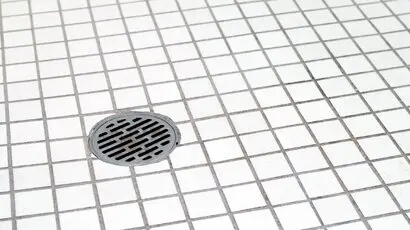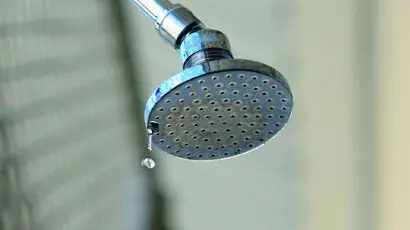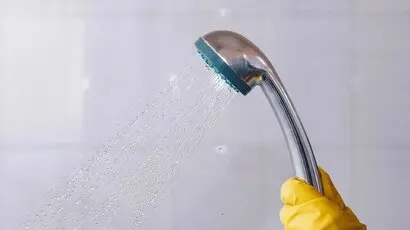Hard water is a common problem in Melbourne and the surrounding areas due to high levels of minerals such as calcium and magnesium in the water supply. This mineral-rich water can have a big impact on household plumbing fixtures, particularly shower heads. Over time, these minerals can build up inside shower heads, causing clogs, reduced water flow, and eventually leaks.
For homeowners, a leaking shower head is both frustrating and wasteful. Mineral build-up can restrict water flow and increase water pressure, which puts extra strain on components like rubber washers, O-rings, and valve bodies. This pressure might cause dripping, loose connections, or even a complete failure of the seal, leading to a leaking showerhead or arm.
Mineral deposits are often the common cause of leaks in a new showerhead. Still, they can also contribute to issues like low water pressure, uneven water distribution from the shower head faceplate, and leaks in the shower drain or bathroom walls. Addressing hard water-related problems promptly is crucial to prevent further leaks, water damage, and unnecessary waste.
Understanding Hard Water
Hard water with a high mineral content, primarily calcium and magnesium compounds, is common in many areas, including Melbourne. These dissolved minerals naturally occur in groundwater sources, which are the primary water supply for numerous municipalities.
The water treatment processes by local authorities can also add to the mineral-rich water supply. While treatments like chlorination and filtration remove many impurities, they often miss dissolved minerals. As a result, mineral-heavy water is sent through residential water systems.
![]()
The effects of this mineral-rich water on household appliances, pipes, and fixtures can be extensive. As the water flows through these systems, the minerals precipitate and form scale build-up on surfaces. This scale accumulation can lead to reduced efficiency, clogged pipes, and premature failure of appliances and fixtures.
In the case of a shower head, the mineral deposits can accumulate inside the shower head and arm, gradually restricting the water flow and causing issues like low water pressure, uneven distribution from the shower head faceplate, and even leaking showerheads or shower arms. The rubber washers and O-rings within the shower valve can also suffer from mineral build-up, leading to worn seals, loose connections, and potential leaks.
If left unattended, mineral-related issues can escalate, causing further damage and wasting significant amounts of water. Regular maintenance, descaling, and prompt replacement of worn components like the rubber washer and O-ring can help mitigate these problems and extend the lifespan of household plumbing fixtures.
The Impact of Hard Water on Shower Heads
Mineral Buildup Inside A Shower Head
Over time, the mineral deposits from hard water can accumulate inside shower heads, creating a persistent and potentially damaging issue. As the water supply flows through the shower head, the dissolved minerals gradually precipitate and form scale build-up on the internal components and intricate pathways.
![]()
Restricted Water Flow and Clogs
This mineral build-up can act like a clog, restricting the water flow and causing various problems. Initially, you may notice a decrease in water pressure or an uneven distribution from the shower head faceplate. As the build-up worsens, the water flow can become further obstructed, leading to a dripping shower head or, in severe cases, a complete blockage.
Increased Water Pressure and Leaks
When mineral deposits clog a shower head, they can increase water pressure in the valve and valve body. This pressure stresses seals, rubber washers, and other parts, raising the risk of leaks. A leaking shower head, arm, or valve body often results from long-term mineral build-up.
![]()
Consequences of A Leaky Shower Head
A leaking shower can have various consequences for homeowners. Water damage is a significant concern, as leaks can accumulate moisture, potentially causing mould growth and structural issues in bathroom walls or floors. Additionally, a leaking shower head or valve can result in higher water bills due to the constant dripping or water flow, wasting valuable resources.
Beyond the immediate impact on the shower system, leaks can also affect other areas of the bathroom or even adjacent rooms if left unattended. Proper maintenance and promptly addressing leaks are crucial to prevent further damage and unnecessary water waste.
Identifying Shower Head Leaks Caused by Hard Water
![]()
Signs of a Leaky Showerhead
One of the first indicators of a shower head leak caused by hard water build-up is a steady drip or dripping shower, even when the water is turned off. Additionally, you may notice water stains or moisture around the shower arm, suggesting a loose connection or worn seal.
Inspecting for Mineral Deposits
Inspect the shower head and arm for mineral deposits or clogs to identify if the leak is related to hard water. Remove the shower head and look for white, chalky build-up inside the nozzles or pathways. This build-up can restrict water flow and cause leaks.
Differentiating from Other Causes
While mineral build-up is common, dripping showerheads can result from faulty rubber washers, worn seals, or damaged components. Carefully examine the shower head and valve for any visible cracks, breaks, or signs of wear. Leaks originating from the valve body or faucet handle may indicate issues beyond hard water build-up.
Solutions and Prevention Strategies
Regular cleaning and descaling of shower heads can prevent mineral build-up. Installing water softeners or filtration systems reduces the mineral content in household water. To resist hard water build-up, it is recommended that old, clogged shower heads be replaced with new, efficient models. Promptly addressing leaks is crucial to prevent further damage and water waste.
Don’t Let Hard Water Ruin Your Shower Experience
Hard water and its mineral content can lead to leaking showerheads, shower leaks, and dripping showerheads due to build-up and clogged seals. Addressing these issues promptly through regular maintenance, water softening systems, or showerhead replacements prevents further damage and wastewater.
Are you experiencing a leaking shower in Melbourne? Contact WP Plumbing for expert plumbing services for professional advice, installations, or leak repairs related to hard water and leaky showerheads. We are your go-to plumbers for all things leaks!







